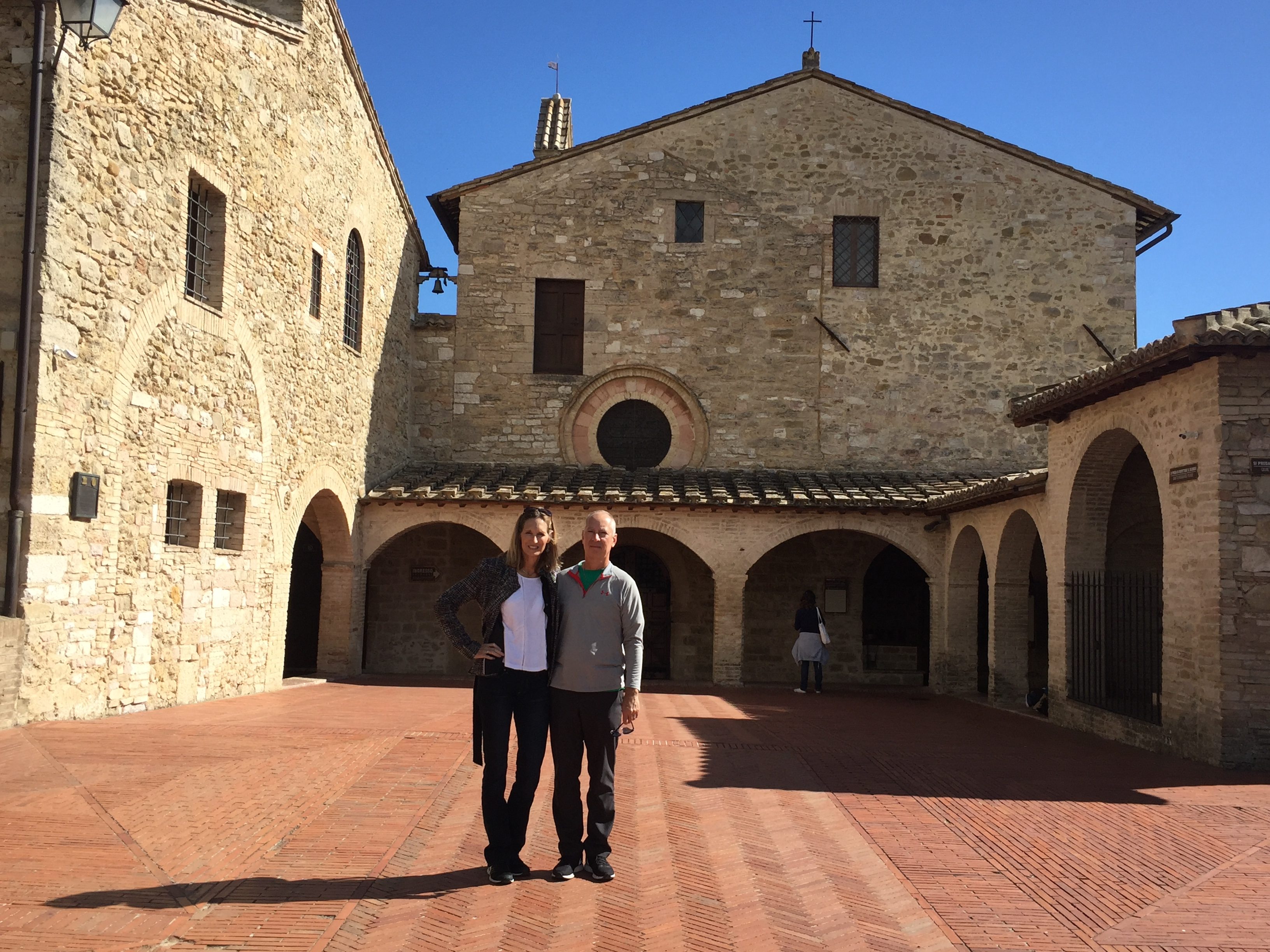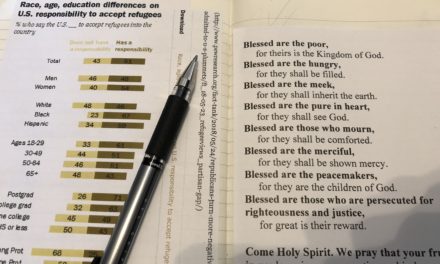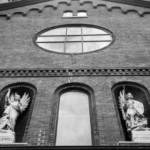I know many of you like Richard Rohr, O.S.F. I certainly do too. I took a doctoral class with him; I’ve traveled out to Albuquerque to sit under his tutelage. I have listened to his podcasts and I have read at least eight of his books. I quote him all the time.
Still, as one of the Benedictine brothers at Conception Abbey stated, “When Richard is on, he is really on. And when he’s off, he’s way off.” So here’s a little comment on Rohr’s recent blog touting the merits of French Jesuit philosopher, Pierre Teilhard de Chardin (1881-1955). de Chardin seems to maintain a strong popularity among critically thinking Christians because de Chardin sought to synthesize Christianity and evolution back during the height of Modernism. Everyone seems to want to figure out how to make evolution and Christian thought work together. de Chardin made it work. Rohr states that de Chardin presents an evolution of consciousness (Rohr’s constant theme for the past decade or more).
de Chardin was brilliant (a scientist and mystic) and influenced an entire generation of Christians (Rohr’s generation and the one prior to him – 1950s) by speaking of “the Christ-Omega,” where Jesus inaugurates the ascent of humanity in an ever upward evolutionary process ending in a “perfection” of human consciousness. In the very long run for de Chardin humanity will be “in God,” as Christ was in the Father (John 17).
N.T. Wright critiques de Chardin as representing the “myth of progress” school of thought. The myth of progress thought is what I anecdotally call “the Star Trek myth:” that someday humanity will gradually “evolve” into a peaceful, diverse, all-accepting, all embracing, ‘star-people’ – no war, no conflict, no needy among them, no compulsions. We will zoom around the galaxy in a cool ship enjoying the explorer’s life, gently correcting evil-doers, awakening them to our “uberman” consciousness, and bring peace and happiness to all.
de Chardin was necessarily a pantheist because “God” needs to be within this world, that is, part of the essence of all things, and all things have a “god-consciousness.” (Simplistically, Pantheism believes God is equal to creation, or God is creation and vice a versa.) By the way, as a mystic myself I am not opposed to conveying some notion of consciousness to all creation like Paul suggests in Romans 8:22 (all creation groans in pain waiting to be redeemed…) But orthodox Christianity keeps the Creator separate from the created – or as I like to put it, ‘I never think Monet’s Water Lilies is actually Claude Monet’.
Wright’s critique of de Chardin asks the question, “What about evil?” How is evil dealt with? de Chardin and the myth of progress school has no answer. As Wright states, “What kind of God would build the eventual kingdom of heaven on the bones of Auschwitz?” Evolutionary optimism cannot deal with nor explain evil notes Wright. Sad news like Michael Brown’s death/Ferguson are shrugged off as minor bumps on the road to a beautiful future – some day. But Brown’s death cannot be reconciled within the myth of progress. de Chardin has nothing to say to Brown’s family.
The myth of progress is the water we swim in within Modernist secularism. Wright states that the news media and politicians assume de Chardin’s progress myth all the time, case in point, when the news seems perturbed by the latest mass shooting, as though to say ‘we should all be over this sort of thing by now people!’ The myth of progress believes that education, technology, and science will bring about a golden age, a human-produced “heaven.”
Check your own beliefs: When you read about one of the many conflicts in the Middle East or in Africa or some other “less educated” class of people in the world, do you think ‘well, if they just knew what I know, if they just could learn to read, or embrace some technology that would solve their economic woes… they’d see the light and stop killing each other.’ If you answer this way then you’ve been indoctrinated in the myth of progress school.
In the Christian worldview, grace and love, redemption and resurrection will not only usher in the kingdom of God, but answer evil, bringing justice to Auschwitz, natural disasters, trauma, and war. The proper Christian worldview does not believe the world “will burn,” but rather be transformed by the power and presence of God. It will be the same earth and heaven but new. See 2 Peter 3:11-13 where far from the earth and heavens being vaporized and gone, there is a new “righteous” creation home. It is not some cartoon heaven with clouds and harps, or even some Eldorado with literal gold streets, but a purified god-filled place we call heaven. I believe we will recognize it. Like all good theology there is continuity and discontinuity: something the same, and yet something different. But this is not a gentle upgrading like evolutionary optimism conjures in the myth of progress school. But rather it is “like the pangs of child birth,” sudden and revolutionary (see Matthew 24:8; 1 Peter 1:3; see especially all of 1 Cor. 15 with Paul’s multiple metaphors for what the resurrected life and world will be: first fruits, a king subduing enemies, the death and life of seed, Adam and the new Adam).
This is where Wright and I part company with the 19th century dispensationalist ‘rapture cult’ who believe redemption means destruction instead of real redemption, that is, “to turn something in and make it new and whole again” – not gone. For more on this topic we must get acquainted with Neo-Platonism and the pervasive influence of dualistic thinking, which has effectively split the Christian life from the world, leaving Christians to save disembodied souls to a disembodied heaven, while the creation of God is ignored.
From a spiritual and mystical point of view Rohr is excellent on this topic of non-dual thinking. But Wright is better from a philosophical and theological point of view, which is the arena of de Chardin.
Modernism, dualism, and de Chardin’s evolutionary optimism fail to factor in redemption and resurrection states Wright. I always find it curious that popular culture thinks of evolution and its rough adaptation to social evolution mean that “we all gradually get better,” where evolution may mean a disease erases the human race, or on a social level the Islamic State somehow really does take over the world, killing off most, creating slaves, sex slaves, erasing history, thieving, and torturing their way to crushing power. Evolution doesn’t mean everything turns out better – it can go real bad!
I have now spent the last decade attempting to introduce good Christians to a more authentic understanding of resurrection. I don’t really think I’ve been that successful. People still think in polar terms: they think either the dualistic Neo-Platonic rapture is the world’s end; or they think de Chardin’s evolutionary optimism (the myth of progress) is how the world will end up. I think Wright is more true to the biblical message.
I will continue to embrace much of Rohr’s thought – but not all. I suggest we not conflate non-dual thinking with de Chardin’s adaptive Christ-Omega evolution. When Christ returns we will all live long and prosper. Until then we take the journey of the Saint (not the Hero), and love and bring justice, stand against sin, and journey with the voiceless and eschew power.









